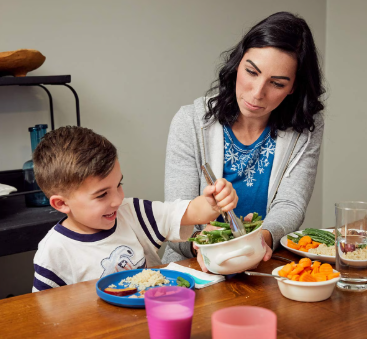Creating a home environment that encourages healthy habits begins with parents leading by example. Children are remarkably observant and often mimic the behaviors they see most frequently. When parents prioritize their own well-being, they send a strong, positive message that health matters, shaping lifelong habits for their children. A few thoughtful strategies can help parents model wellness in a way that feels natural and inspiring.
One of the simplest ways parents can demonstrate healthy living is through nutrition. Children notice what their parents eat, how meals are prepared, and the kinds of foods kept in the house. By choosing fresh fruits, vegetables, whole grains, and lean proteins, parents teach children to value balanced meals. Involving children in meal preparation not only makes healthy eating a family activity but also helps them learn practical skills and develop an appreciation for wholesome food. Parents can model moderation, emphasizing enjoyment and variety rather than strict rules, creating a positive relationship with food that children can carry into adulthood.
Physical activity is another area where parents can lead by example. Daily movement does not have to mean structured exercise sessions; it can include walking together after dinner, playing active games, or doing stretching routines at home. When children see their parents making time for activity, it normalizes an active lifestyle. Even small gestures, such as taking the stairs instead of the elevator or choosing to walk or bike for short trips, reinforce the message that movement is an enjoyable and essential part of daily life.
Beyond diet and exercise, mental and emotional health play a vital role in overall wellness. Parents who manage stress in constructive ways demonstrate to children that emotional well-being is important. Simple habits like taking deep breaths, setting aside quiet moments for reflection, or maintaining a hobby can teach children that self-care is a priority. Open communication about feelings and challenges, without judgment, also helps children understand that experiencing stress is normal and manageable, fostering emotional resilience.
Sleep is another crucial component of health that parents can model effectively. Consistent sleep routines, including regular bedtimes and screen-free evenings, highlight the importance of rest. Children naturally follow the example set by adults. When parents prioritize sleep, it signals that rest is not optional but a necessary part of staying healthy and functioning well each day.
Creating a healthy home environment extends beyond personal habits to the atmosphere parents cultivate. Encouraging family meals, setting aside time for conversation, and limiting screen time all contribute to an environment that supports wellness. When parents participate in these practices themselves, they reinforce their value. Celebrating small successes, like completing a week of balanced meals or enjoying a family walk, strengthens the connection between healthy behaviors and positive experiences.
Hydration is often overlooked but is another simple way to model wellness. Parents who consistently drink water throughout the day and limit sugary beverages demonstrate a straightforward yet powerful health practice. Children observing this behavior are more likely to adopt similar habits, understanding the importance of staying hydrated for energy and overall well-being.
Another meaningful aspect of modeling healthy behavior is responsible use of technology. Many families struggle with screen time, but when parents demonstrate moderation, it sets a clear example. Prioritizing face-to-face interactions, engaging in activities without screens, and showing that entertainment does not always require a device helps children appreciate balance. Children learn that technology is a tool, not a substitute for real-world experiences, relationships, and activities.
Mental stimulation and curiosity are also vital for holistic wellness. Parents who read regularly, pursue learning opportunities, and encourage exploration instill a love for knowledge in their children. This habit not only supports cognitive development but also fosters self-confidence and adaptability. Sharing the joy of discovering new ideas or engaging in creative projects reinforces the notion that nurturing the mind is just as important as caring for the body.
A positive outlook and gratitude are behaviors parents can consciously model. Expressing appreciation for small moments, acknowledging achievements, and practicing kindness within the family teach children how to navigate life with optimism and compassion. Emotional health and positive thinking go hand in hand, and children learn these skills through observation as much as instruction. When parents approach challenges with a solution-oriented mindset and model empathy toward others, children absorb these behaviors and carry them forward.
Finally, parents should remember that perfection is not the goal. Healthy living is about consistency, balance, and flexibility. Children notice honesty and effort more than flawless execution. Admitting mistakes, trying again, and showing that healthy choices are a journey rather than a strict set of rules helps children internalize these lessons in a realistic and sustainable way. Parents who maintain a forgiving and encouraging attitude toward themselves and others create a nurturing environment where health becomes a natural part of daily life.
In conclusion, setting a healthy example at home is about more than following guidelines; it is about creating a lifestyle that children can observe, understand, and emulate. By prioritizing balanced nutrition, regular activity, emotional well-being, adequate sleep, mindful technology use, and positive thinking, parents provide a model for their children to follow. These practices, woven naturally into daily routines, send a clear message that health is valuable and achievable. Through consistent actions and a supportive home environment, parents lay the foundation for their children’s long-term physical, emotional, and mental well-being, fostering habits that will serve them for a lifetime.






